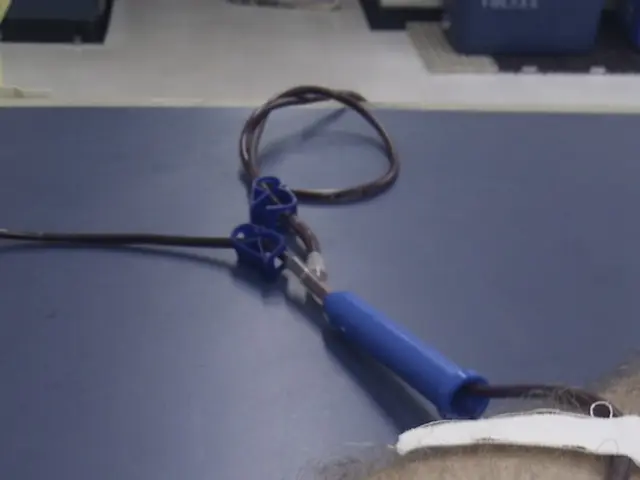Coffee's potential impact on aging and life expectancy: An intriguing perspective.
Chilling news for coffee lovers: Your coffee habit might help you age gracefully
Sip that morning joe with pride, folks! Recent research presented at the Nutrition 2025 conference has some exciting findings - a cup of Joe might just be the secret ingredient for healthy aging, especially for the ladies.
Coffee has long been suspected of offering various health perks, such as minimizing the risk of liver issues and diabetes. But the true question on everyone's minds? How does it influence us—particularly women—as we age?
Well, buckle up, because the results from a recent study, shared at the biennial Nutrition 2025 conference between May 31 to June 3 in sunny Orlando, FL, may have just answered that question. The study indicated that regular coffee intake could boost women's chances of not developing major chronic diseases and physical or mental limitations as they enter their golden years.
So what exactly did this study entail? The researchers looked at data from nearly 48,000 women (yup, you read that right) in the Nurses' Health Study. They analyzed the participants' caffeine consumption from decaf and regular tea, cola, and decaf and regular coffee to determine how coffee might contribute to healthy aging.
Most of the caffeine intake, it turns out, came from coffee. And guess what? The median caffeine consumption at baseline was a hefty 315mg daily. Total caffeine intake and regular coffee consumption increased participants' chances of experiencing healthy aging and its subdomains—like living a long life free of physical and mental maladies.
However, it's essential to note that the study's results are yet to be published in a peer-reviewed journal.
So, what exactly defines healthy aging in this study? Participants were labeled as healthy agers if they managed to live to at least 70 years old, stayed free of 11 major chronic diseases, had no physical functional limitations, mental health or cognitive impairments, and no memory complaints.
Brewing the facts
Now, before you grab a Starbucks run, let's remember that this research is still relatively new, and there's much more to learn. The data only included white women, so the question remains—would similar results be found in different demographics? Also, since at least some data relied on the participants' self-reported health information, there could be some inaccuracies. And of course, further research is necessary to address confounding factors and consider other age ranges and healthy aging outcomes.
Despite these questions, the findings have managed to grab the attention of experts in the field. According to Dr. Bruce G. Rankin, President of the Florida Osteopathic Medical Association, meta-analysis studies could help solidify the theory that moderate daily caffeinated coffee consumption offers long-term benefits for women. If the results remain consistent when repeated, it could suggest that caffeinated coffee offers a clinically significant health advantage over time for women.
Dr. Sherry Ross, a board-certified OB/GYN, doubtlessly agrees. In a statement to the press, she emphasized that coffee, with its antioxidants and other beneficial compounds, should be encouraged for healthy aging. Although she did remind us that caution should still be practiced, particularly for those taking medications or battling chronic conditions, as caffeine can have potential interactions to watch out for.
So, before you raise that coffee mug in celebration, recall the wise words of the study's author, Sara Mahdavi: "Coffee is not universally beneficial." Whether you're a java junkie or a decaf devotee, it's essential to remember that personalized nutrition will be crucial in the future. And remember, healthy aging doesn't stop at just your choice of beverage. So keep up those good habits - regular exercise, a balanced diet, and plenty of sleep—and let's all strive for a longer, healthier life!
- The research presented at the Nutrition 2025 conference suggests that coffee, particularly for women, could contribute to healthy aging and reduce the risk of chronic diseases.
- The study, which analyzed the caffeine consumption of nearly 48,000 women, found that regular coffee intake could boost women's chances of experiencing healthy aging.
- Healthy aging in this study is defined as living to at least 70 years old, staying free of 11 major chronic diseases, having no physical functional limitations, mental health or cognitive impairments, and no memory complaints.
- Despite some uncertainties surrounding the study, such as only including white women and relying on self-reported health information, experts like Dr. Bruce G. Rankin and Dr. Sherry Ross are optimistic about the potential benefits of moderate caffeinated coffee consumption for women's health and longevity.
- Personalized nutrition will be crucial in the future, and while coffee may offer health benefits, it's essential to consider other factors like exercise, diet, and sleep for overall well-being and healthy aging.
- Whether you're a coffee lover or not, prioritizing a healthy lifestyle through regular exercise, a balanced diet, and quality sleep is essential for a longer, healthier life, especially for seniors, women, and those focusing on mental health, nutrition, aging, and women's health.








